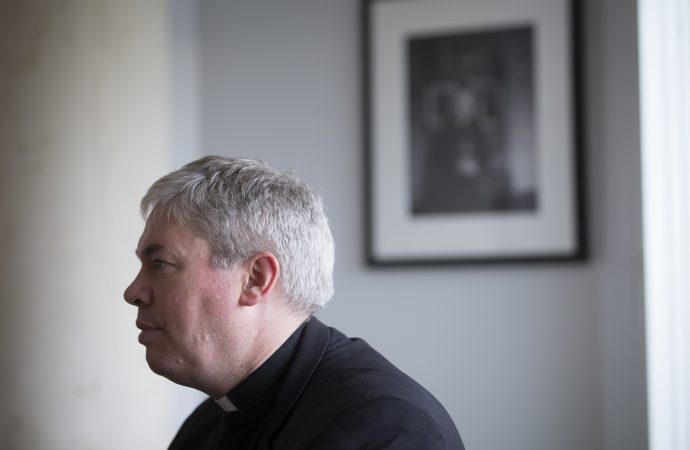For Australian Bishop Richard Umbers, his attendance at this year’s March for Life is part scouting expedition, part pilgrimage.
As an auxiliary bishop in Sydney, Umbers hopes to see a March for Life established in his country. In an interview with Crux, he said he’s here to both join in protesting abortion, but also to understand the logistics of the world’s largest pro-life gathering.
“We’re always looking to the U.S. for various kind of initiatives, given that Australia is a kind of similar society,” he said. “Of course we have our differences, but the reality is more and more we’re similar. We even celebrate Halloween now, which is inconceivable to me!”
“The influence of the United States is ever greater, especially with the Internet and social media - for good and for bad - but we’re looking to take from the good,” said Umbers.
Born in New Zealand, Umbers moved to Australia in 1992 for university studies. In 2016, he was made a bishop, becoming the youngest member of the Australian hierarchy. Now, at age 47, he’s a regular presence at youth events, and he’s acquired a reputation as being tech savvy - on Twitter, he playfully goes by the name “Bishop Down Umber.”
In Washington, however, he’s observing everything about the March for Life, the U.S. Church, and America as a whole, as this marks his first visit to the United States.
When it comes to the abortion debates, he believes there are important similarities and differences.
In New South Wales, the Australian state where Umbers resides, abortion is technically illegal, but the vague definitions that allow for it for the sake of the health of the mother makes abortion widely accessible.
In the United States, he observes, Roe v. Wade - the 1973 Supreme Court decision which legalized abortion, and whose anniversary the March for Life is organized around - is a flashpoint which many Americans use to harness energy in favor of the pro-life cause.
So while the American and Australian legal systems inform and shape public debates over the issue, at the heart of it he believes is “a clash of visions,” about the human person that divides society over concern for human life.
He laments the manner in which the phrase “reproductive health” has been hijacked to include a push for abortion as part of basic healthcare rights, especially since he believes it “basically says we’re not made in the image and likeness of God.”
Umbers is in Washington with a group of 120 young people from the archdiocese of Sydney, which is part of the delegation of 200 that are en route to World Youth Day in Panama next week. He’s hoping that their experience at the March for Life will serve as further evidence that they’re not alone in caring about life or their Catholic faith.
“Something like the March for Life gets very little coverage back in Australia so it’s important for them to see that sea of young people and say ‘I never knew,’” he told Crux.
“The same thing happens with World Youth Day,” he continued. “It’s why you take them, to see there’s a lot of people in this and they’re not alone.”
Umbers likens the experience to pilgrims who head to Rome or to the Holy Land to immerse themselves in the shared Catholic faith, which has a universal reach.
“It helps you realize the faith is, of course, much bigger,” he continued, adding that he hopes it increases “their conviction that we can actually live the gospel.”
Yet Umbers isn’t pollyannaish about the uphill battle at hand.
The Catholic Church in Australia - like that of the United States - has been roiling from the ongoing fallout from the clerical sexual abuse crisis, and Umbers is sensitive to the reality that in many corners the Church has a credibility gap.
“Just because some people haven’t lived up [to the Gospel], doesn’t mean it has to be put aside,” he insists. “It can’t.”
“The crisis of institutions is not confined to ourselves. It’s across the board,” he continued.
Yet he believes that it’s precisely on these occasions, such as the March for Life and World Youth Day, which show the reality of those living out the faith in meaningful and uncompromised ways.
“There’s a renewed optimism [with young people] because they can and they are making a difference with the help of the Holy Spirit of creating a society of peace and love,” he said.
In fact, he believes in time that witness will serve as the most compelling thing and ultimately win out, as it’s welcoming and inclusive.
“To take the image of God seriously in each and every person has enormous implications as to how we treat one another,” he said.
“I want to live in a society where we say ‘everyone is welcome. And we love you,’” he insisted. “We want to be 100 percent in favor of life.”
“As Catholics, we embrace the messy, we embrace those that don’t fit the bill,” he continued.
“With that well-placed optimism that we can have a civilization of love, it’s worth getting involved in and it’s worth the time and effort,” he concluded - be it in Australia or America.

